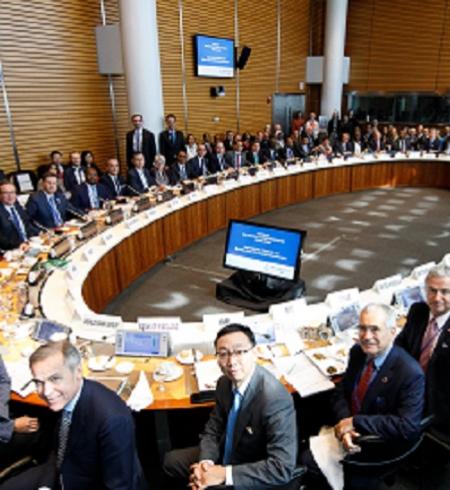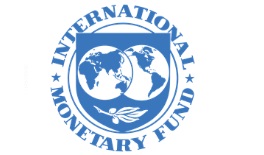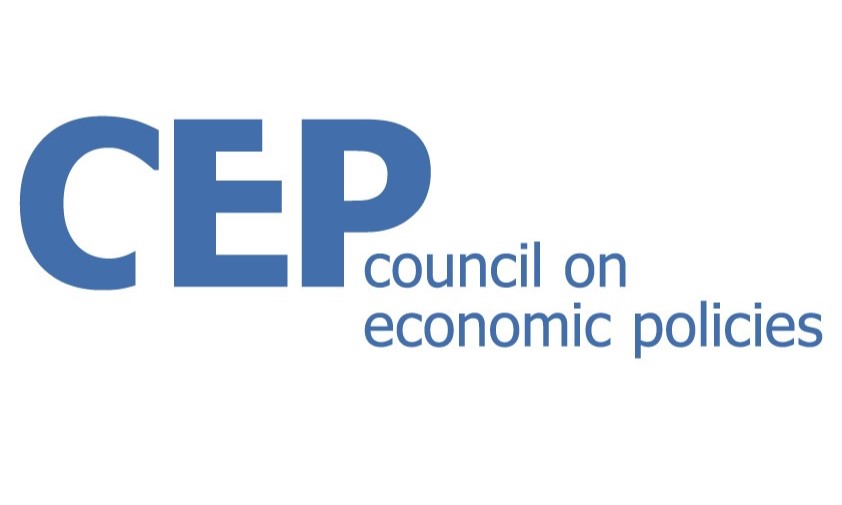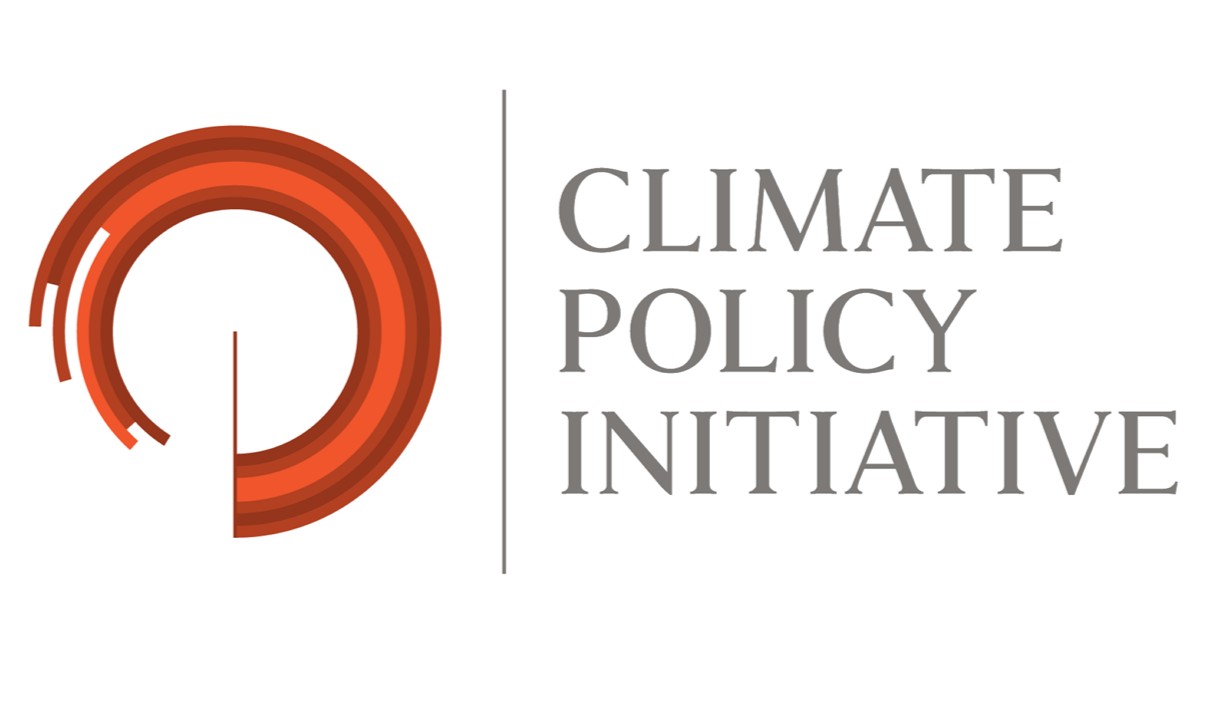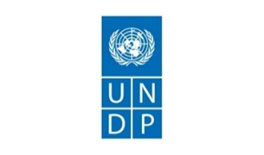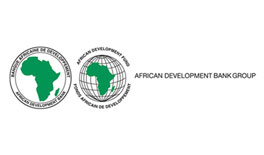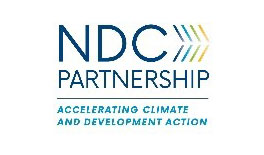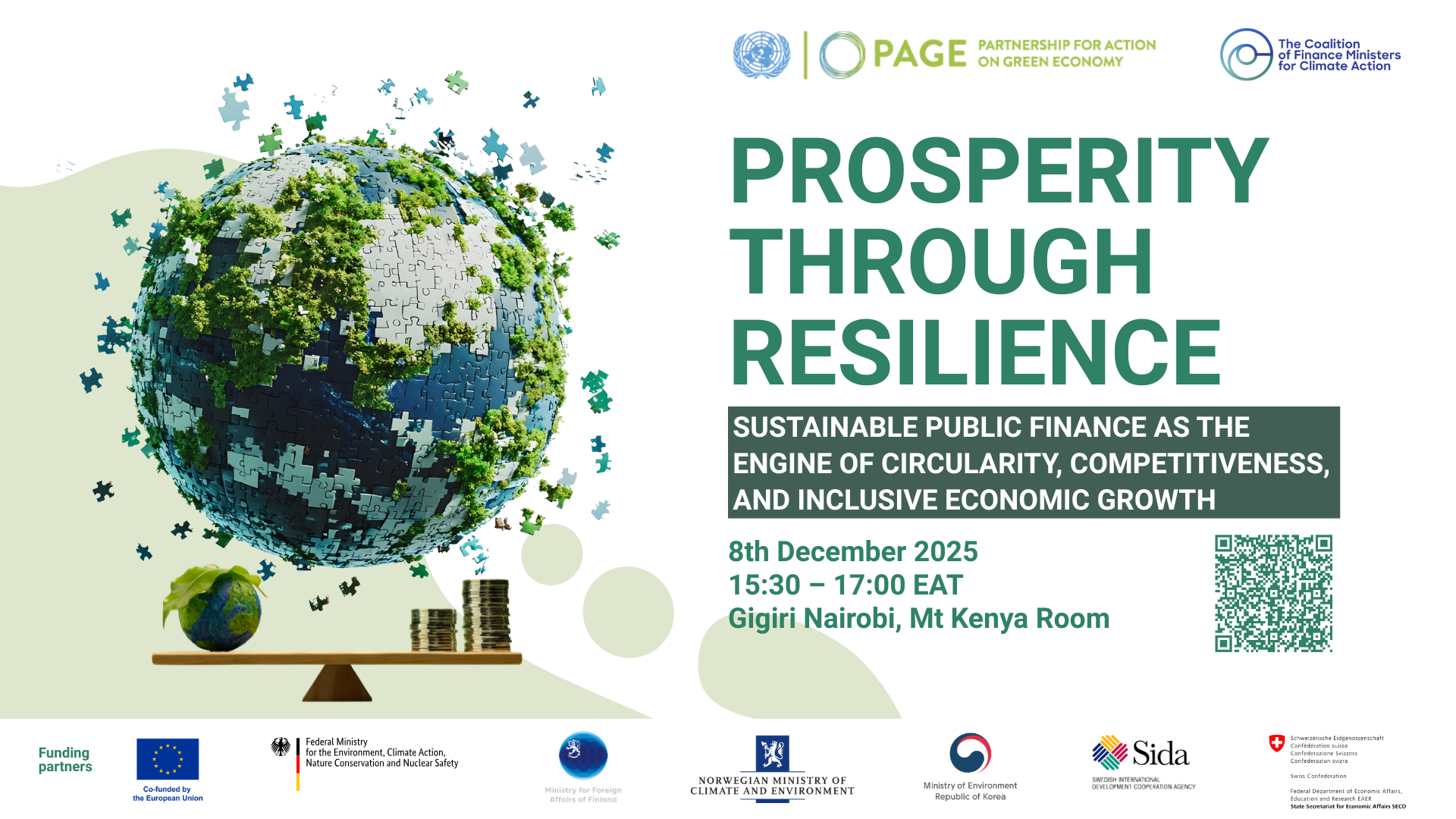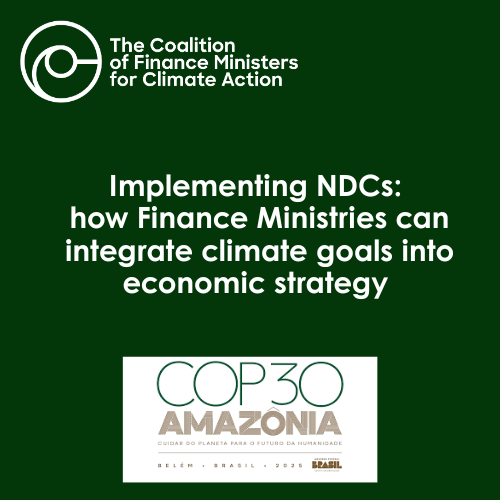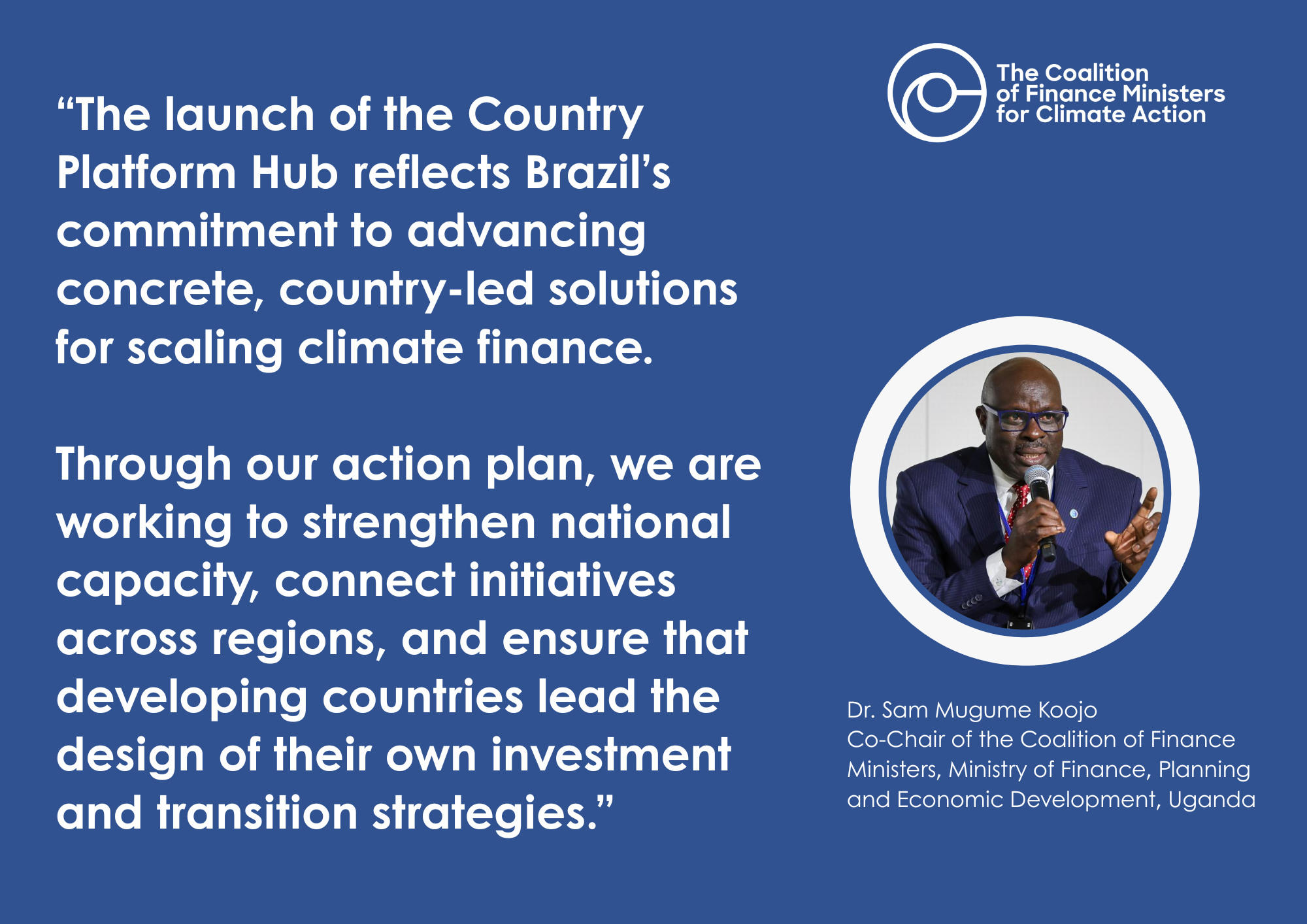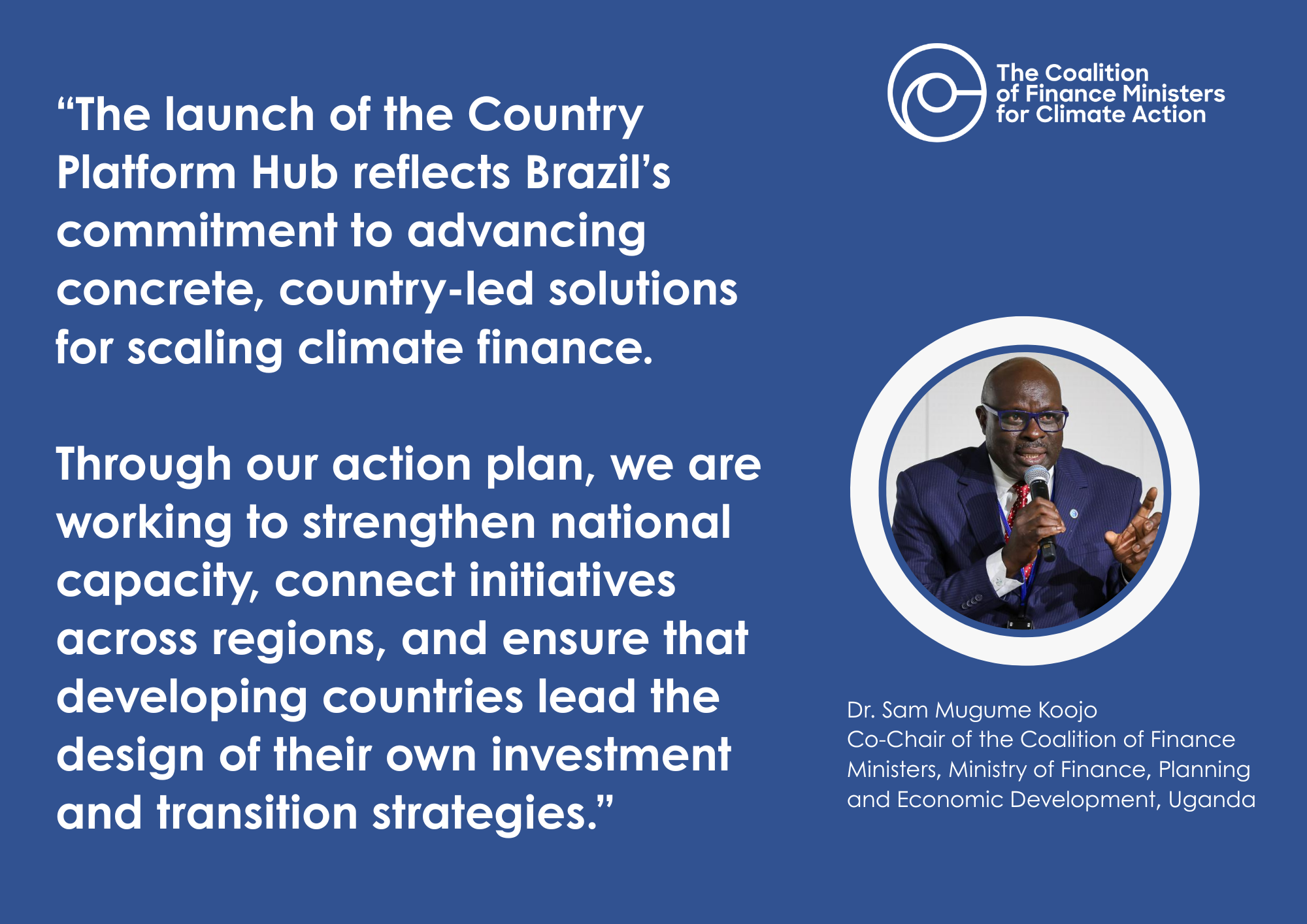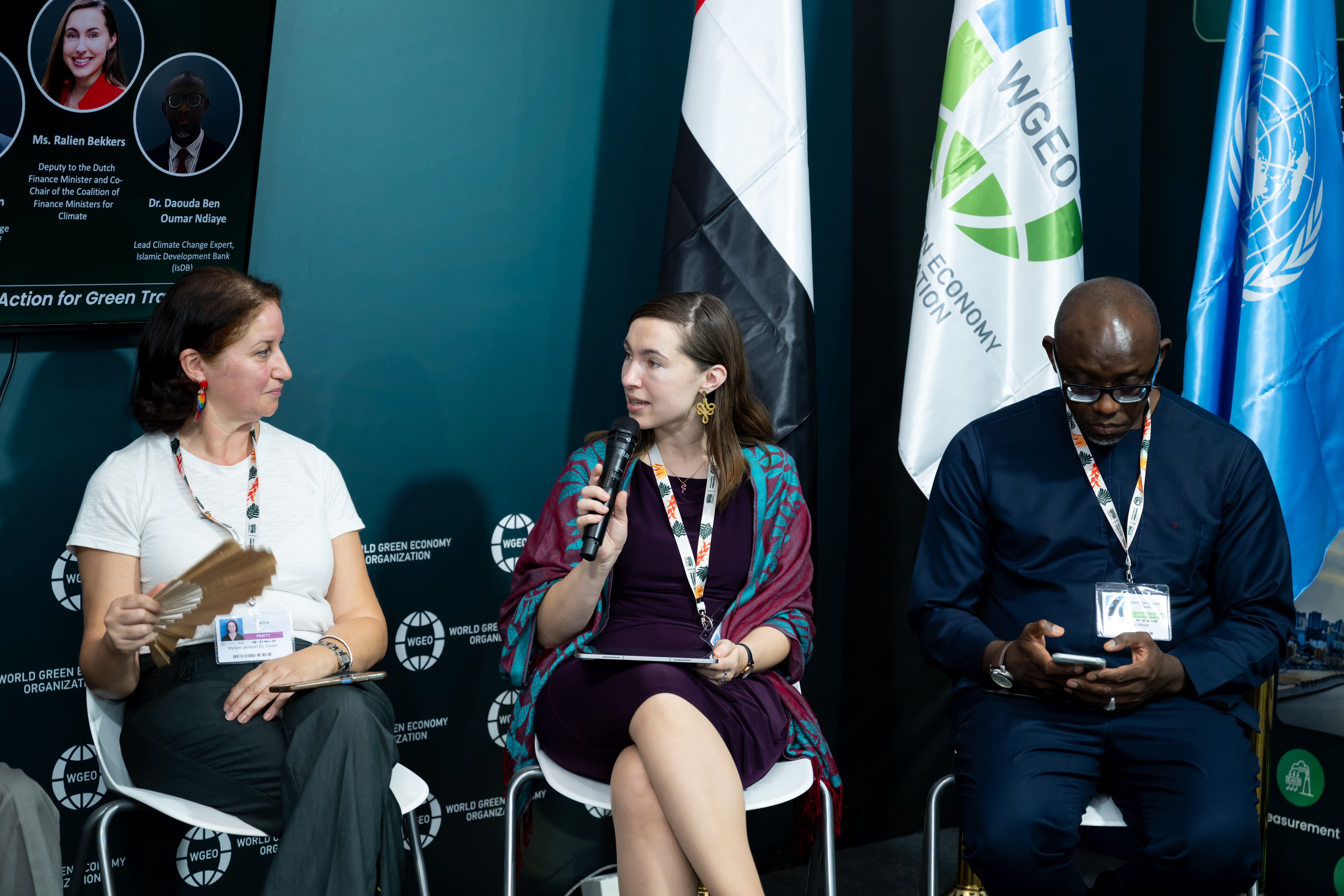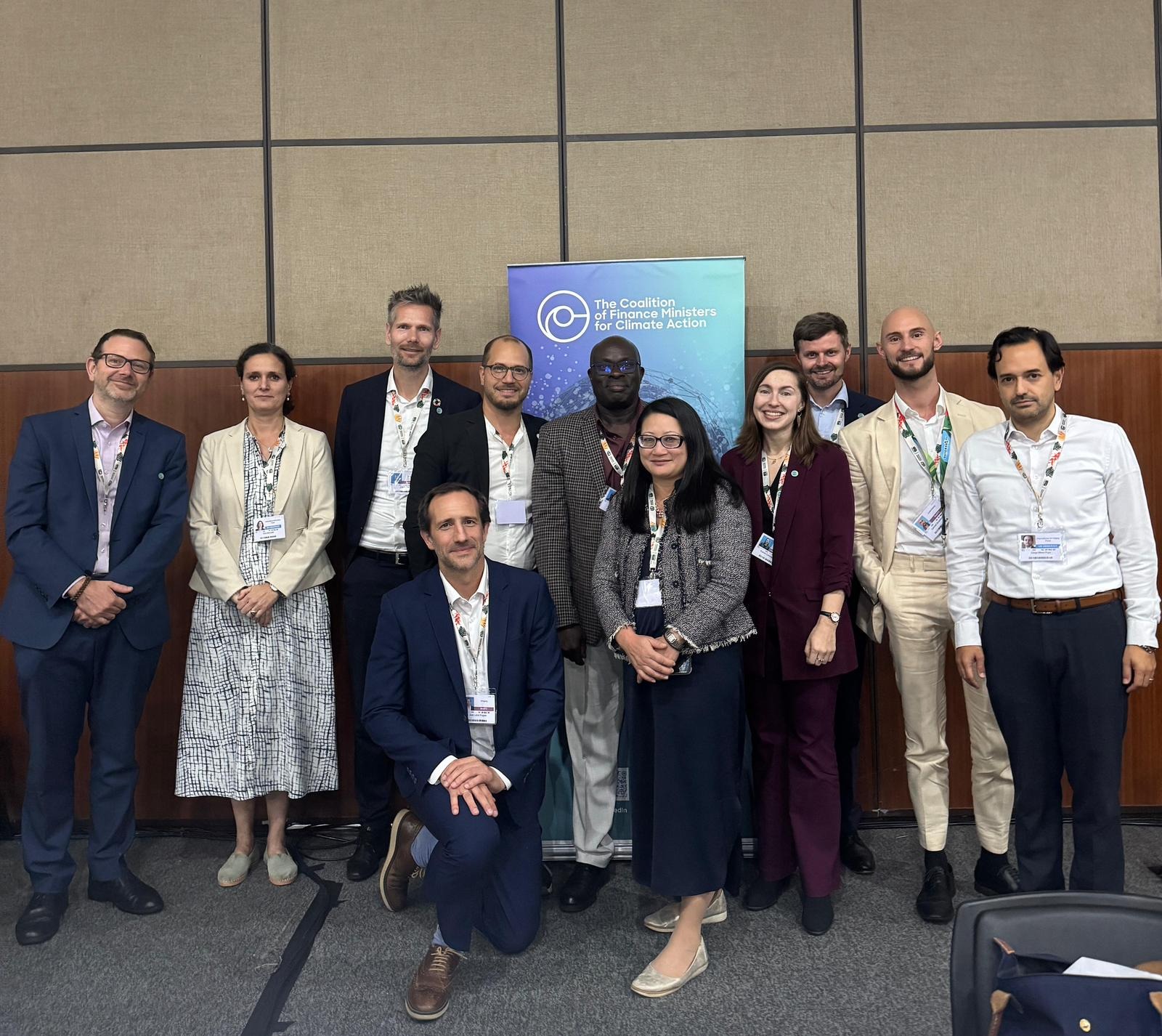Post-Ministerial Discussion following the 14th Ministerial Meeting
From Promise to Action: Scaling Up Climate Finance to $1.3T
Discussion Note
Managing over US$30 trillion in public expenditures, more than one-third of global GDP, Ministries of Finance hold the fiscal, regulatory, and policy levers needed to direct resources toward development and climate priorities. With this influence, they can unlock the scale of global investment required to address climate change, funding that must rise and be sustained at a minimum of 2–5% of global GDP annually.
Recognizing the influence and role that Ministries of Finance can play in scaling up climate action, the Coalition of Finance Ministers for Climate Action organized a technical post-ministerial event to discuss scaling up climate finance, managing physical climate risks, and deploying market-based financing mechanisms. The discussions between member countries and institutional partners reflected a growing recognition of the evolving role of Ministries of Finance in climate policy, highlighting the need to move decisively from ambition to action and to embed climate considerations within core fiscal and economic decision-making processes.
Participants acknowledged that public finance can serve as a catalyst for climate investments, but private finance is essential to scale them. Participants also recognized that proactive investment today could help avoid greater costs and higher debt burdens in the future.
A critical point raised was the need to close the gap between the Ministries of Finance and the Ministries of Environment. Ministries of Finance are responsible for managing public funds and driving economic growth, while environment ministries often handle concessional finance and focus on environmental priorities, climate targets, and policies. Bridging the gap between these ministries is essential for efficiently utilizing scarce concessional capital and ensuring that climate policies are integrated into broader economic strategies.
This note is organized around three key takeaways from the meeting. Additional insights captured during the facilitated breakout sessions and plenary segment are also reflected.
Takeaway 1: Country-led, politically anchored platforms must be tailored to national contexts.
Country platforms are increasingly recognized as valuable mechanisms for translating plans into tangible climate and development outcomes, coordinating stakeholders, mobilizing finance, and enhancing the efficiency and effectiveness of financial utilization. They serve as operational structures to implement climate actions aimed at adaptation, resilience, and a just transition within communities and at the macroeconomic level. Country platforms are expected to be funded by domestic and global sources including governments, the private sector, and multilateral institutions. One of the core functions of these platforms is to map public, private, and concessional finance flows, identifying gaps and leveraging investment opportunities. This ensures alignment with national priorities and planning instruments, such as Nationally Determined Contributions (NDCs) and National Adaptation Plans (NAPs). Participants emphasized that there is no “one-size-fits-all” model: platforms illustrate coordination in practice, but each country may establish a structure suited to its institutional context and domestic decision-making processes. Some countries have established dedicated platforms (e.g., Brazil and Egypt) while others have integrated similar functions into existing governance structures (e.g., Denmark and the United Kingdom). Regardless of form, platforms must be politically owned and domestically led, ensuring national leadership in design and implementation. Transparent reporting and disclosure are also crucial for maintaining credibility with investors, donors, and citizens.
Key Considerations for Ministries of Finance
- Lead or strengthen country-level coordination mechanisms for climate policies to ensure alignment with domestic strategies and priorities, planning instruments, and fiscal frameworks.
- Reframe climate action as a fiscal opportunity within the platform by identifying measures to unlock new sources of revenue and investment (e.g., reducing fossil fuel subsidies to free up fiscal space for platform-prioritized investments) and without diverting resources from other development priorities.
- Use the platform to identify priority investments, sectors, and reforms grounded in Nationally Determined Contributions (NDCs), Long-term Strategies (LTS), National Adaptation Plans (NAPs), and National Transition Plans (NTPs), to provide a coherent demand signal to public and private financiers.
Integrate climate targets into investment screening, budget planning, and debt management to ensure platform priorities are reflected in actual resource allocation.
Takeaway 2: Ministries of Finance require more effective tools and data to assess systemic climate risks and engage the private sector through policies such as mandatory insurance.
Physical climate risks are fundamentally a macroeconomic issue with far-reaching impacts on livelihoods, businesses, and fiscal sustainability. Countries globally face significant data limitations, which pose challenges for analysis, alongside building effective macro-economic models and analytical tools. While there has been progress in mainstreaming mitigation policies into core functions such as tax policy and budgeting, progress on adaptation remains slow. This is primarily attributed to the insufficient availability of climate risk data and challenges in quantifying adaptation costs and investments. Participants highlighted that a lack of reliable data affects the quality of risk assessments and the overall understanding of adaptation needs. Participants also discussed the need to shift towards a system-based approach for risk management (i.e., moving beyond the protection of individual assets to safeguarding interconnected systems, such as transport networks linked to hospitals). This approach, while more effective, is also more costly and requires stronger buy-ins from the private sector. Mandatory insurance policies for businesses were highlighted as a potentially effective mechanism for risk transfer (e.g., in Italy). This involves gradually introducing a mandatory insurance scheme, supported by a state-backed reinsurance fund to cover a portion of claims, and requiring companies to insure assets against climate-related disasters. However, the challenge of weak or non-existent insurance sectors in some developing countries was noted, raising questions about alternative mechanisms for addressing these issues. Ultimately, Ministries of Finance will need to strengthen their data systems and create regulatory and financial conditions that facilitate risk-sharing.
Key Considerations for Ministries of Finance
- Invest in capacity building, data collection, and analysis for integrating climate risk data into macroeconomic modeling, fiscal planning, and public investment appraisal processes. Promote systems-based approaches to asset management by revising investment appraisal criteria and requiring resilience considerations in project preparation and procurement.
- Adopt insurance, risk-financing, and other risk-transfer mechanisms to reduce exposure to climate risks (e.g., sovereign risk pools, catastrophe bonds, and contingent credit lines).
- Develop strategies to incentivize private sector adaptation investment through tax incentives, blended finance instruments, climate-resilient procurement rules, and disclosure requirements.
Takeaway 3: Effective carbon pricing requires phased implementation, equity safeguards, and international coordination to scale impact.
Carbon pricing instruments, including carbon taxes, carbon border adjustments, and market-based mechanisms such as emissions trading schemes, were identified as critical tools for reducing greenhouse gas emissions. There was broad agreement that carbon pricing remains one of the most efficient mechanisms for driving emission reductions, but that country’s context must be considered in its design. The challenges associated with carbon pricing were also acknowledged, with participants noting that implementation is often a complex process. One of the main drawbacks discussed was the regressive nature of carbon pricing, which can disproportionately impact lower-income households and emission-intensive trade-exposed industries, depending on the scope of fuels or emissions covered. As such, there was consensus that carbon pricing should be designed to balance fiscal and environmental effectiveness with equity, with prudent use of additional fiscal space to provide support to vulnerable households, businesses, and sectors as well as incentives for clean investment (e.g., Ireland, Germany, Netherlands, and Sweden). International coordination and gradual implementation were deemed essential for ensuring the credibility and sustainability of carbon pricing mechanisms. Participants agreed that building confidence through gradual implementation and transparent market rules can help countries transition towards broader, more connected carbon pricing frameworks.
Key Considerations for Ministries of Finance
- Recycle revenues back into the economy through investments or compensation mechanisms for vulnerable households to ensure fiscal and social considerations are met.
- Balance environmental objectives with the need to maintain economic competitiveness by assessing potential impacts on sectors and designing policies that mitigate negative effects (e.g., providing incentives for clean investments).
- Establish clear signaling strategies for future price increases to foster market confidence and facilitate smooth transitions.
- Link carbon pricing systems to enhance credibility, scalability, and price convergence – and simplify cross-border trade and investment.
Download here the discussion note







